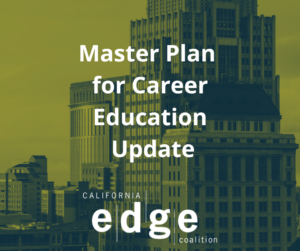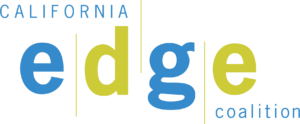 In December 2024, Governor Gavin Newsom released his Master Plan for Career Education, which directs key state agencies and higher education institutions to prepare all learners for the evolving workforce by enhancing career pathways, emphasizing practical skills, and improving access and affordability through streamlined collaboration. This framework will receive a $100 million investment to implement key components of the plan. Check out the executive summary here. Look at EDGE’s recent budget summary linked here for proposed funding details tied to the Plan.
In December 2024, Governor Gavin Newsom released his Master Plan for Career Education, which directs key state agencies and higher education institutions to prepare all learners for the evolving workforce by enhancing career pathways, emphasizing practical skills, and improving access and affordability through streamlined collaboration. This framework will receive a $100 million investment to implement key components of the plan. Check out the executive summary here. Look at EDGE’s recent budget summary linked here for proposed funding details tied to the Plan.
The Master Plan is intended to be inclusive to all learners, with built-in flexibility to meet the needs and situations that make education and workforce training available and accessible in preparation for the upcoming economic landscape. The Master Plan identifies six primary areas of action:
- Create a State Planning and Coordinating Body
- Strengthen Regional Coordination
- Support Skills-Based Hiring Through a Career Passport
- Develop Career Pathways for High School and College Students
- Strengthen Workforce Training for Young People and Adults
- Increase Access to, and Affordability, of Education and Workforce Training
EDGE is proud to report that several of long term priorities and early recommendations from our diverse coalition are reflected in the final version of the Master Plan. Proposals include empowering opportunity youth and adult learners, advancing credit for prior learning, and strengthening data sharing. We’ve shared a few of our adopted recommendations below:
Strengthening work-based learning: We are pleased to report that the master plan calls for a shared approach from various stakeholders in enhancing work-based learning through regional coordination, high school and college opportunities, and sector-based pathways. Work-based learning offers numerous benefits for students, employers, and educational institutions by bridging the gap between classroom education and real-world experience. For students, they receive practical experience and increased employability, while for educational institutions and employers, the benefits can come from an enhanced curriculum and a strong talent pipeline.
Empowering Opportunity Youth (OY): we are pleased that the Master Plan names and promotes strategies that intend to remove barriers for OY seeking entry into workforce training or educational opportunities. The plan further suggests focusing on sector-based pathways that will strengthen workforce training for young people.
Increase access for underserved communities: Throughout the framework, the master plan promotes the availability of various programs to meet learners where they are while providing the most feasible, up-to-date learning options, especially the development of programs that support communities of color, including undocumented workers. The Master Plan successfully details the importance of access and the critical nature that opportunities provide for underserved communities in this critical landscape.
Increase flexible learning approaches like adult dual enrollment, credit for prior learning, and competency-based education opportunities: The Master Plan framework provides many opportunities for learners to discover what workforce, educational, and career paths may best fit their current and future circumstances. Dual enrollment, a longtime priority for EDGE, was highlighted. The Plan acknowledges that flexibility for individualized learning pathways like competency-based methods that focus on students’ mastery of skills and outcomes through demonstrated proficiency rather than time spent learning.
Strengthen statewide data: The Plan calls for the continued investment in the Cradle-to-Career Data System (C2C) and urges agencies and higher education institutions to deepen their participation with C2C to leverage comprehensive data that will inform program development, implementation, and accountability, leading to continuous improvement in outcomes for students and employers.
EDGE would like to thank Governor Newsom and his team for their leadership in the development of this Plan and for uplifting many of EDGE’s long-term priorities such as access, affordability, pathways to good jobs, and the importance of strategies focused on adults that have disconnected from education and training as well as opportunity youth. We look forward to ongoing collaboration throughout the planning and legislative process. Stay tuned for advocacy opportunities.
